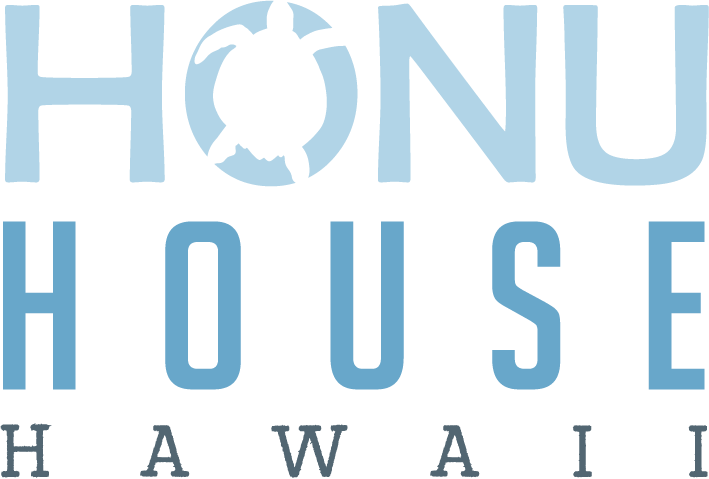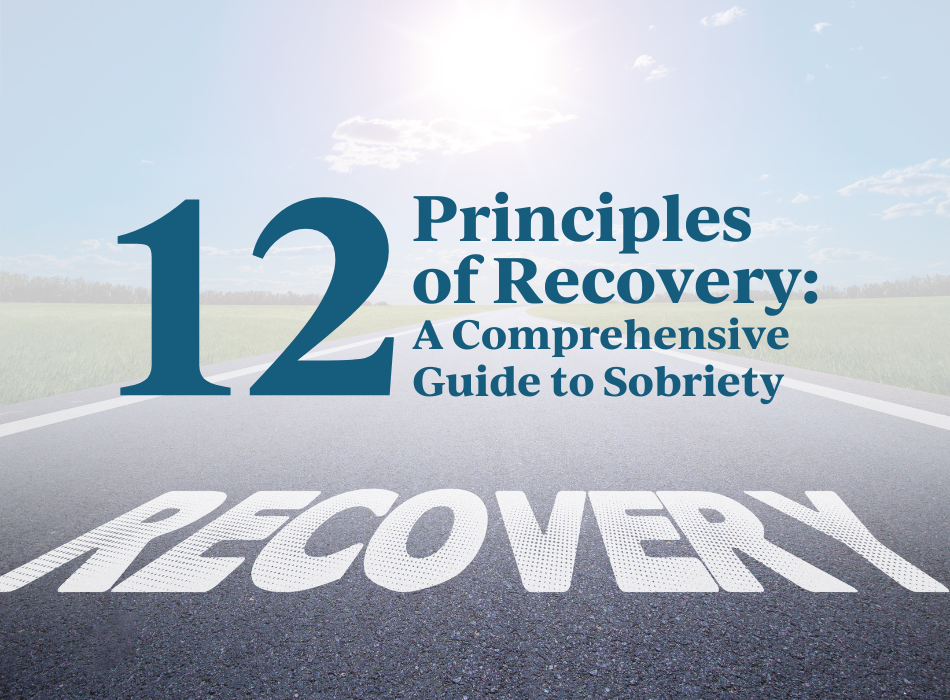
12 Principles of Recovery: A Comprehensive Guide to Sobriety
If you or someone you love is battling with addiction, you might have heard about the 12 guiding Principles of Recovery. Millions of people have found hope and healing through 12-step programs like Alcoholics Anonymous (AA), Narcotics Anonymous (NA), and Marijuana Anonymous (MA).
But if you’re new to the 12 guiding Principles of Recovery, you might wonder: what exactly are they? Here, we’ll break down each of them, explaining their role in the recovery journey.
AA's 12 Principles of Recovery
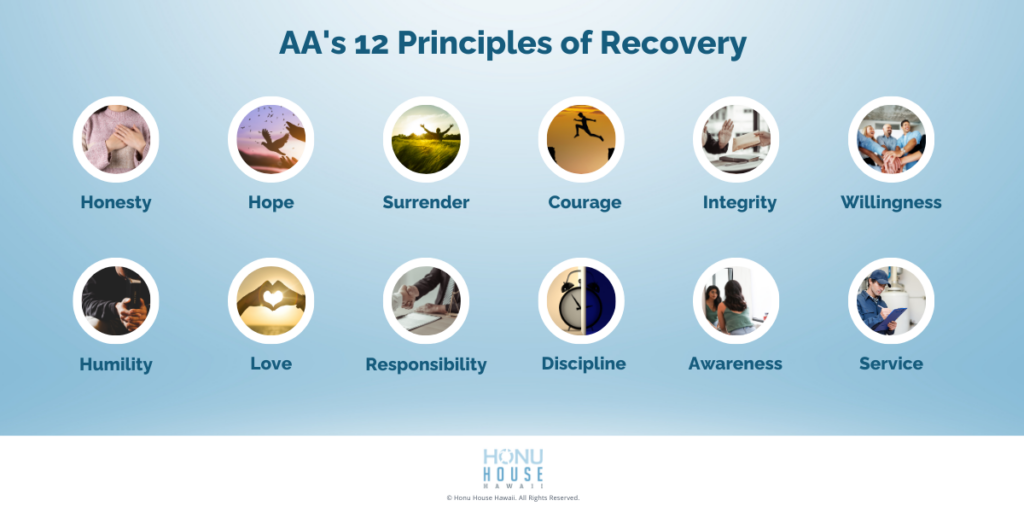
The 12 Principles of Recovery, introduced by AA, are a powerful framework for addiction recovery. Here’s a breakdown of each principle and how you can apply them in your recovery journey:
1. Honesty
True recovery starts with admitting you have a problem. It’s not about feeling ashamed. It’s about recognizing you are powerless over your addiction and the turmoil it has caused in your life.
Be candid with yourself about what causes your urges to turn toward addictive substances. For instance, you can keep a journal of your substance abuse, noting each relapse and the feelings or events that precede it.
2. Hope
Addiction can feel hopeless. But it isn’t. The 12 Principles of Recovery emphasize the power of hope. Hope is the belief that things can get better, that you can overcome addiction and live a fulfilling life.
Read recovery stories, listen to uplifting podcasts, and attend AA meetings. Surrounding yourself with positive influences can reinforce your hope and commitment to your recovery journey.
3. Surrender
Addiction can feel like a solitary struggle. But it doesn’t have to be. Surrender means acknowledging you can’t manage your addiction by yourself and require assistance. This doesn’t mean accepting defeat. It means recognizing your methods haven’t worked and accepting you’re at the mercy of a higher power.
Practice surrender by following the guidance of a addiction counselor or therapist without arguing or resisting their suggestions, even when it feels uncomfortable.
4. Courage
Recovery takes courage. It takes courage to face the challenges of recovery and confront the painful parts of your past that may have contributed to your addiction. It calls for courage to open up and seek help.
Challenge yourself to step outside of your comfort zone by sharing your fears and experiences in group sessions. Sharing them can be daunting, but speaking your truth can work wonders for your recovery journey.
5. Integrity
Integrity means aligning your actions with your values. It’s about staying true to yourself and honoring your commitment to sobriety.
Integrity also means being accountable for your words and actions. For instance, if your addiction led you to hurt others, this principle of recovery emphasizes reaching out to make amends where possible.
6. Willingness
Change is tough. However, recovery requires a willingness to be open to new, positive ideas.
Be willing to learn new coping mechanisms and let go of people, places, or habits that trigger you. For instance, try new recovery activities like meditation, art, or excursions. Also, be open to attending AA meetings. Being receptive to new ideas and activities can significantly enhance your recovery.
7. Humility
Humility in recovery means acknowledging that you’re a small fish in a large pond. It’s about accepting that addiction is a powerful condition, and you’ll need help to overcome it.
So, let go of pride and self-sufficiency. Admit you can’t do it alone. Learn from the peers in your 12-step program and allow others to assist you on the path to recovery.
8. Love
Recovery is a journey of self-love and extending love to others. Learn to forgive yourself for past mistakes. Practice self-care and compassion.
Also, treat other people battling with addiction with empathy. Build healthy relationships with others grappling with addiction and offer to support them on their path to recovery. This practice can connect you to something bigger than yourself and foster a sense of belonging.
9. Responsibility
Recovery involves taking ownership of your actions and their consequences. This principle of recovery is critical to making healthier choices and maintaining sobriety.
For instance, you can take responsibility by setting daily, weekly, or monthly goals related to your recovery, such as attending AA meetings or journaling regularly, and holding yourself accountable to these commitments.
10. Discipline
About 40 to 60% of individuals in treatment for substance abuse disorders relapse, according to the National Institute on Drug Abuse. That’s why 12-step programs emphasize discipline.
Discipline involves maintaining the new habits that promote your sobriety. It’s about remaining consistent, even when it’s challenging.
For example, you can develop discipline by creating a structured daily routine that creates time for work, meals, exercise, leisure, and sleep. This strict routine can serve as a guide and reinforce healthy habits, making you less susceptible to relapse.
11. Awareness
Staying aware of your triggers and cravings is critical to preventing relapse. It allows you to detect situations, emotions, or people that cause an urge to use substances.
Practice mindfulness techniques like meditation, yoga, or journaling to observe your cravings or negative emotions and manage them effectively.
12. Service
Service is about giving back and supporting others in their recovery. By sharing your experiences with newcomers, you can reinforce your sobriety. Additionally, you can inspire others to work towards sobriety by showing them that it’s possible to overcome addiction.
Consider volunteering at an addiction recovery center, mentoring someone on the road to recovery, or sponsoring someone taking a 12-step program. Helping others can enhance your commitment to sobriety and provide a sense of purpose and connection.
Pros and Cons of the 12 Principles of Recovery
The 12 Principles of Recovery isn’t a magic bullet. Although it may be effective for some, it may not suit everyone. Here’s an overview of the pros and cons to help you decide whether a 12-step program is right for you:
Pros
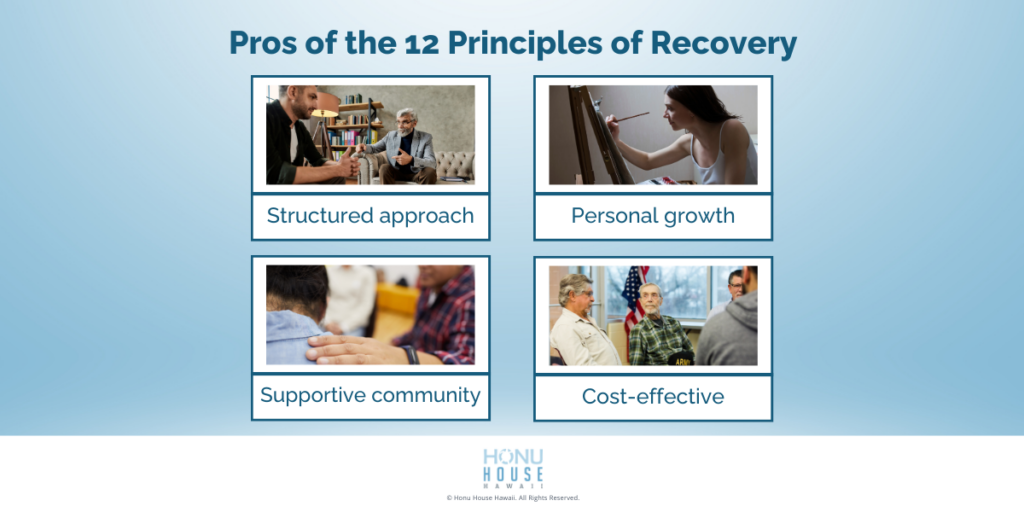
Structured approach: The 12 guiding principles provide a clear, proven path that has helped millions overcome addiction.
Personal growth: Besides helping individuals overcome addiction, 12-step programs instill other values like honesty, hope, and self-compassion, which are key ingredients to long-term sobriety.
Supportive community: Participating in 12-step programs introduces individuals to peers who are on the road to recovery and who can provide support and accountability.
Cost-effective: 12-step programs like AA are widely available for free, making them accessible to most people.
Cons
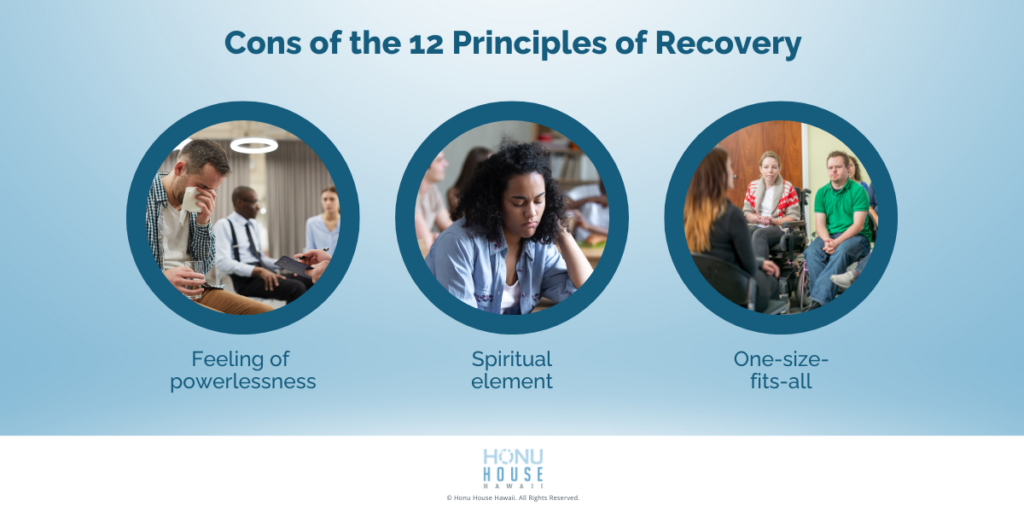
Feeling of powerlessness: The focus on admitting powerlessness can be unappealing to people who believe in self-empowerment as crucial to recovery.
Spiritual element: The spiritual aspects of 12-step programs may not resonate with everyone, particularly those seeking a non-religious approach.
One-size-fits-all: Many 12-step programs take a blanket approach that might fail to address the needs of certain individuals, such as people with co-occurring mental health or chronic health complications. Additionally, 12-step programs don’t address physical complications that may require detox, such as withdrawal due to cessation of substance use.
Get Started on 12-Step-Based Addiction Recovery Care in Hawaii
The 12 guiding Principles of Recovery have empowered countless individuals to overcome addiction and live productive lives. By following these principles, you can build a strong foundation for long-term sobriety.
If you or a loved one is considering a 12-step program in a serene and supportive addiction recovery center in Hawaii, look no further than Honu House. We offer an intensive 12-step program that can help you in your journey toward recovery and overall well-being.
Contact us today to learn more about our 12-step-based treatment program or the other group therapy services we offer.
FAQs
How Long Does It Take to Go Through the 12 Principles of Recovery?
The time it takes to work through the 12 Principles of Recovery can vary widely from individual to individual. Recovery is a personal journey, and each individual progresses at their own pace. Some may go through the principles in a few months, while others might take years to integrate these practices into their life.
Can I Participate in the 12 Principles of Recovery If I’m Not Religious?
While the 12 guiding Principles of Recovery were initially rooted in spiritual concepts, many non-religious individuals and groups have adapted the principles to fit a secular recovery model. The concept of a higher power is open to interpretation, allowing you to participate in a way that respects your beliefs.
Are the 12 Principles of Recovery Effective for Any Type of Addiction?
The 12 Principles of Recovery are primarily associated with overcoming alcohol addiction, as AA started the 12-step program. However, the principles have been effectively adapted to help individuals with various types of addictions, including substance abuse, sex, porn, gambling, and even food addiction.
How Do I Determine If a 12-Step Program Suits My Needs?
Attending several meetings or sessions is the best way to determine if a 12-step program suits you. This allows you to interact with others in the program, hear their experiences, and see how to apply the 12 Principles of Recovery. You can also consult addiction recovery professionals to recommend the best course of action based on your specific circumstances.
What’s the Primary Difference Between 12-Step Programs and Other Interventions?
The 12 Principles of Recovery are designed to promote spiritual growth and sobriety through community support and a structured step-by-step process. Other recovery interventions might focus more on medical treatment, psychotherapy, or cognitive-behavioral approaches. While many addiction professionals use various addiction treatment methods, the right method depends on preferences, specific needs, and sometimes the type of addiction.
-

By John Burke
-
May 6, 2024
